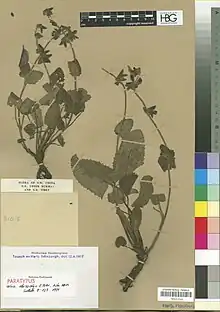| Salvia schizocalyx | |
|---|---|
 | |
| Scientific classification | |
| Kingdom: | Plantae |
| Clade: | Tracheophytes |
| Clade: | Angiosperms |
| Clade: | Eudicots |
| Clade: | Asterids |
| Order: | Lamiales |
| Family: | Lamiaceae |
| Genus: | Salvia |
| Species: | S. schizocalyx |
| Binomial name | |
| Salvia schizocalyx E. Peter | |
Salvia schizocalyx (the Burmese cleft sage) is a perennial plant that is native to Yunnan province in China, growing at 4,000 m (13,000 ft) elevation. The plant grows on one to a few unbranched upright stems with widely spaced leaves, reaching approximately 45 cm (18 in) tall. The leaves are broadly ovate to narrowly triangular-ovate, and rarely oblong-ovate, typically ranging in size from 2 to 5 cm (0.79 to 1.97 in) long and 1.2 to 4.5 cm (0.47 to 1.77 in) wide, though they can grow larger.
Inflorescences are 2–4-flowered verticillasters on terminal racemes, with a blue or violet corolla that is 2 to 2.5 cm (0.79 to 0.98 in) long.[1]
Notes
- ↑ "Lamiaceae" (PDF). Flora of China. Harvard University. 17: 157. 1994. Archived from the original (PDF) on 2010-07-14.
This article is issued from Wikipedia. The text is licensed under Creative Commons - Attribution - Sharealike. Additional terms may apply for the media files.